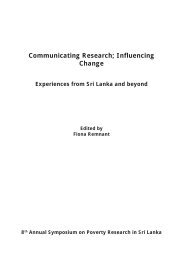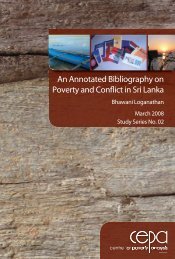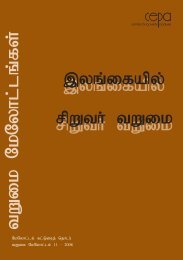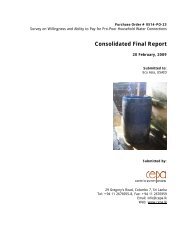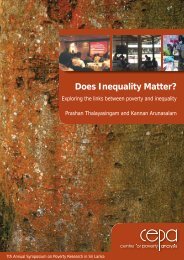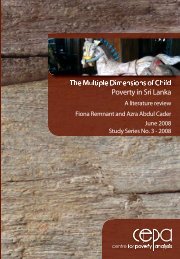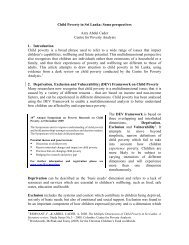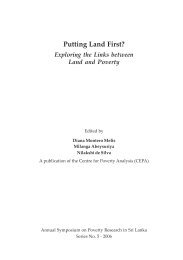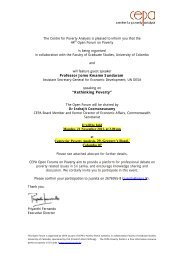Involuntary Displacement and Resettlement â Policy and ... - CEPA
Involuntary Displacement and Resettlement â Policy and ... - CEPA
Involuntary Displacement and Resettlement â Policy and ... - CEPA
- No tags were found...
You also want an ePaper? Increase the reach of your titles
YUMPU automatically turns print PDFs into web optimized ePapers that Google loves.
3 From <strong>Policy</strong> Categories to Labelling to Social Categories:an Analytical Framework 4[…] acknowledging the effectiveness of coping strategies provides us with a ‘counterdiscourse’ to the traditional humanitarian labels of ‘vulnerable groups’, beneficiaries<strong>and</strong> recipients’ […]. The displaced have personal <strong>and</strong> social histories, they constituteheterogeneous groups with competing interests, <strong>and</strong> they act with different goals <strong>and</strong>ambitions in mind. Generally speaking, the universal categories of humanitarianassistance ignore these distinctions <strong>and</strong>, because of that, displaced communities aretreated as relatively homogenous groups, solely or mainly defined by theirexperience of war <strong>and</strong> displacement (Vincent 2001:6, with reference to Sørensen1998).‘Internally Displaced Persons’ can be understood as a label – a politically <strong>and</strong>socially constructed category established to deal with certain people in aspecific context. The IDP label has developed in the policy context ofrestrictive asylum policies <strong>and</strong> indicates that labels are by no means neutral;they embody concrete relationships of power <strong>and</strong> influence the way we think<strong>and</strong> act (Escobar 1995). A problem with much of the discussion of internaldisplacement is the taking for granted of the IDP category. Its unintendedconsequences are not often addressed.Andrew Shacknove (1985) claims that, ironically, for many people on thebrink of disaster, refugee status is a privileged position. In contrast to otherimpoverished people, refugees – <strong>and</strong> increasingly also IDPs – are entitled tomany forms of international assistance. This means that labels include some<strong>and</strong> exclude others. A common underst<strong>and</strong>ing of the IDP <strong>and</strong> refugee labelsis that people belonging to these categories are ‘out of place’, that theybelong somewhere else. Being labelled ‘out of place’ <strong>and</strong> only temporarilypresent, however, tends to exclude refugees <strong>and</strong> IDPs from otherentitlements. I have shown elsewhere that IDPs in Sri Lanka are excludedfrom certain citizenship rights because they are not formally registered aslocal citizens of the place where they live (Brun 2003).There are other forms of exclusion from this category. Many groups of forcedmigrants are excluded from the label, such as people displaced by hugeirrigation projects or by environmental change, <strong>and</strong> labour migrants of whom4This section is based on <strong>and</strong> developed from Brun 2005.129



